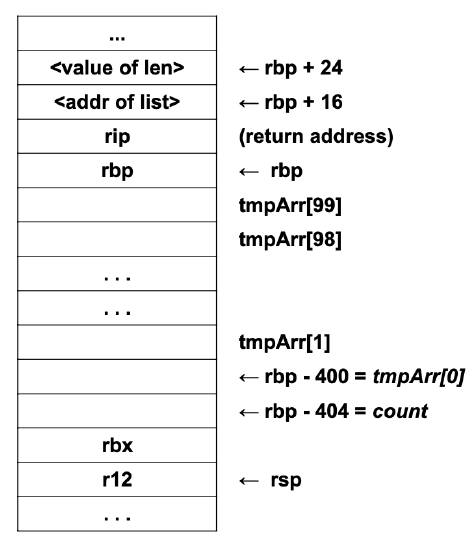12.8: Stack-Based Local Variables
- Page ID
- 58055
If local variables are required, they are allocated on the stack. By adjusting the rsp register, additional memory is allocated on the stack for locals. As such, when the function is completed, the memory used for the stack-based local variables is released (and no longer uses memory).
Further expanding the previous example, if we assume all array values are between 0 and 99, and we wish to find the mode (number that occurs the most often), a single double-word variable count and a one hundred (100) element local double-word array, tmpArr[100] might be used.
As before, the frame register, rbp, is pushed on the stack and set pointing to itself. The frame register plus an appropriate offset will allow accessing any arguments passed on the stack. For example, rbp+16 is the location of the first stack-based argument (7th integer argument).
After the frame register is pushed, an adjustment to the stack pointer register, rsp, is made to allocate space for the local variables, a 100-element array in this example. Since the count variable is a one double-word, 4-bytes is needed. The temporary array is 100 double-word elements, 400 bytes is required. Thus, a total of 404 bytes is required. Since the stack is implemented growing downward in memory, the 404 bytes is subtracted from the stack pointer register.
Then any saved registers, rbx and r12 in this example, are pushed on the stack.
When leaving the function, the saved registers and then the locals must be cleared from the stack. The preferred method of doing this is to pop the saved registers and then top copy the rbp register into the rsp register, thus ensuring the rsp register points to the correct place on the stack.
mov rsp, rbp
This is generally better than adding the offset back to the stack since allocated space may be altered as needed without also requiring adjustments to the epilogue code.
It should be clear that variables allocated in this manner are uninitialized. Should the function require the variables to be initialized, possibly to 0, such initializations must be explicitly performed.
For this example, the call frame would be formatted as follows:

The layout and order of the local variables within the allocated 404 bytes is arbitrary. For example, the updated prologue code for this expanded example would be:
push rbp ; prologue
mov rbp, rsp
sub rsp, 404 ; allocate locals
push rbx
push r12
The local variables can be accessed relative to the frame pointer register, rbp. For example, to initialize the count variable, now allocated to rbp-404, the following instruction could be used:
mov dword [rbp-404], 0
To access the tmpArr, the starting address must be obtained which can be performed with the lea instruction. For example,
lea rbx, dword [rbp-400]
Which will set the appropriate stack address in the rbx register where rbx was chosen arbitrarily. The dword qualifier in this example is not required, and may be misleading, since addresses are always 64-bits (on a 64-bit architecture). Once set as above, the tmpArr starting address in rbx is used in the usual manner.
For example, a small incomplete function code fragment demonstrating the accessing of stack-based local variables is as follows:
; -----------------------------------------
; Example function
global expFunc
expFunc:
push rbp ; prologue
mov rbp, rsp
sub rsp, 404 ; allocate locals
push rbx push r12
; -----
; Initialize count local variable to 0.
mov dword [rbp-404], 0
; -----
; Increment count variable (for example)...
inc dword [rbp-404] ; count++
; -----
; Loop to initialize tmpArr to all 0's.
lea rbx, dword [rbp-400] ; tmpArr addr
mov r12, 0 ; index
zeroLoop:
mov dword [rbx+r12*4], 0 ; tmpArr[index]=0
inc r12
cmp r12, 100
jl zeroLoop
; -----
; Done, restore all and return to calling routine.
pop r12 ; epilogue
pop rbx
mov rsp, rbp ; clear locals
pop rbp
ret
Note, this example function focuses only on how stack-based local variables are accessed and does not perform anything useful.

